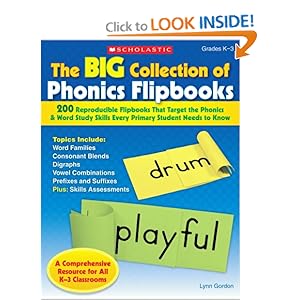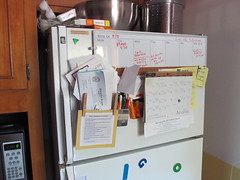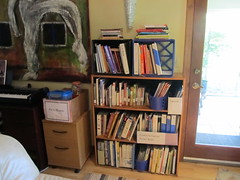
I was thinking of writing a series Kolbe reviews this spring, but kept getting distracted. Then Mrs. Darwin e-mailed me with a couple questions, and I took that as my sign. Back at week five I wrote this summary, and I don’t think much has changed. What I will do this round, though, is to write about the program in general this week, and then do a subject-by-subject set of more detailed reviews in subsequent weeks. Enjoy. And keep me on task, eh?
1. Why we decided to go with a formal program.
Two reasons. #1 is that I wanted to outsource the writing of course plans, because I could. So, the availability of ready-made, day-by-day course plans became a deciding factor in which program to choose.
#2 is that the boy was starting 6th grade, and needed to get his rear kicked. I’m all about relaxed education in the early years. But when you hit 9th grade, son, you need to be ready to work. And that means middle school is for suffering.
Note that I’m only using Kolbe for the 4th and 6th grader. Littles continue to use mom-directed relaxed learning. So all my comments relate to using the program for people who can read competently on their own.
2. How we picked Kolbe Academy.
I knew I needed the course plans. My other deciding factors were:
- Very strong preference for a Catholic program.
- We were planning to use a formal curriculum provider with transcript services through high school; I wanted to try out my likely pick ahead of time.
I gave a serious look at Mother of Divine Grace and St. Thomas Aquinas Academy. For all three, I reviewed the high school syllabus, since that was one of our end goals. Though the programs are similar, Kolbe repeatedly came in as the one that was the closest match to what Jon & I had envisioned for high school for our children.
I also looked through the overall philosophy, the earlier-grades curricula, and the services offered. I spoke to a couple of longtime internet friends who had used the program for ages and graduated students, and also dug around the Kolbe forums and asked a few question about some substitutions I wanted to make. In all it seemed like the best fit for us for a variety of reasons.
3. What Kolbe offers and how it all works.
Kolbe writes a day-by-day curriculum for all subjects all grades. (I think high school might be weekly plans instead of daily?) You can choose to use the program in a variety of ways:
- Just take a look at what they do, acquire your books somewhere, and use those books.
- Purchase course plans for the subjects you want to take. I think they run about $30 per-subject-per-grade-per-year (double check, prices change). This is the best choice if you just want to get a set of plans for one or two subjects. Note that in some classes the plans are very detailed and instructional; in others, they just break up the book into so many pages a day. As I do my subject-by-subject notes, I’ll tell you which are which.
- Enroll with them, which means you get the whole bundle of plans for your grade for one lump sum price, plus some other optional support services. You can request plans for up or down one grade no questions asked. For example, both my 4th and 6th grader are doing the 5th grade history class, because I wanted them on the same subject. (My kids are otherwise working on grade-level.) If you “enroll”, you get to choose whether you submit grades, etc etc. You can choose not to use the reporting and transcript services if you don’t want or need them.
–> If there are several curriculum providers that you think would work just as well, add up your costs for your family. Each has its own pricing scheme, and your needs will determine which is the best deal. Also add up the book costs, because that, too, can vary considerably.
4. The Experience.
When you fill out the form and enroll, a little while later a giant box comes to your door. It contains all your course plans, plus an assortment of forms (for if you wish to submit grades), and a booklet with instructions, philosophical notes, how to write a book report, etc etc. Big fat HSLDA discount code on the front. The course plans are loose leaf printouts with holes punched for three-ring binders. They include some information about the course, the day-by-day plans, and then a quarterly exams and answer keys for most subjects. Each nine-week quarter is seven weeks of lessons, then one week set aside for review, and one week for exams. For most subjects the plans are for a 4-day week, with Friday set aside for review, special projects, catch-up, field trips, etc.
Don’t order plans from the bookstore if you are planning to “enroll”. Even if you need something weird like 10th grade geometry plans for your 2nd grade math prodigy, call or e-mail and see about getting the substitution with your enrollment. [Okay, they are going to question that one.] Basically the approach seems to be that if you’re an enrolled parent with bona fide course plan needs, they take care of you; the various limitations and restrictions are to prevent abuses, not to make your life painful and expensive. But, be organized and don’t have them send you this giant box of all things 4th grade, only to call back a week later and expect all things 5th grade for free because you didn’t know your kid was so smart. Call or e-mail and sort it out efficiently ahead of time.
–> You can request a placement exam when you enroll. You don’t have to take it, let alone send it to anybody. It’s just a set of exams that helps you ballpark your child. Or in my case, quick make sure the kids are introduced to topics they’ll need to know in the coming year.
You acquire your books however you like. They sell them at their bookstore, and some of the in-house publications can of course only be had through their store. But most of the books could also be acquired second hand via cathswap or had from the many other vendors out there. To my knowledge, Kolbe does not include out-of-print books in their curricula. [A complaint I have heard of other programs, but have not verified. Do your own research.] They do use some older-edition books still (or again) being printed; they stock what you need in their shop at reasonable new-book prices.
5. Hand-holding.
A few weeks into our school year, a nice lady called me. She said she was my Kolbe something-or-other, complimented me on my practice of screening phone calls with the machine to avoid interruptions, and asked how things were going. I said, “Going great.” She said, “Wonderful,” and quickly hung up before I could rope her into a longer conversation. We’ve avoided each other ever since. I’m not even sure who she is.
–> If you wanted or needed assistance, they offer it. In addition to your friendly-but-evasive caseworker (I bet she is NOT really avoiding me, okay, seriously, she sounded like a potentially helpful person), you can register at the forums and post questions and get help there. A friend of mine has used the Enhanced Evaluation Service for one of her high school students and says that for that student, it was a good investment. (EES is an additional service at an additional charge above regular bare-bones enrollment.) They also offer some online discussion groups for high school courses, I do not know all the details on that.
[FYI: MODG has a good reputation for online / conference call courses if you are looking for someone else to teach your child a distance education class.]
Additionally, even through high school, you can take whatever class you want. So if you want to take Algebra with a local tutor and all your other courses through Kolbe and six other programs, you can still report through Kolbe and earn a diploma through them as long as you meet the graduation requirements.
If you need standardized testing, Kolbe does offer that, for anybody. I just got a letter in the mail. $45-50 per test for enrolled families, $55-60 for everyone else and their pet monkey.
6. Big Brother. Just not there. Just not. If you want Kolbe to keep track of your grades, you need to send in a quarterly report card (when you get around to it, no particular deadline) with one work sample for each subject. You grade the work, they keep your grades in a file in case someone calls and asks about them. –> I haven’t mailed in any grades yet, though, so I’ll need to follow up with a report on that a different day.
When you submit your first grades of the year, you also send in your course plan — that is, a list of what you’ve actually decided to teach. There is no expectation that you will follow the Kolbe-provided course plans to the letter. Every single plan says, “adapt these to your needs”. Often there are suggestions on how to lighten the load if your student is overwhelmed. There are sometimes suggestions on how to grade, but you make the final decision. You can also just chuck the Kolbe-suggested book and do something else, or skip the subject entirely depending on which subject. If you call or post on the forums, they will suggest alternatives if you don’t like the default book.
7. My kids and the course plans. I put all the plans in binders sorted by subject, and store them in my office. [Next year I am going to make my binders match the subject-sequence of the kids’ binders, so it is faster to move plans in and out.] Then I made each big kid a 3-ring binder Plan Book. I load just the plans for the present quarter, with a tab divider for each subject. I made up a calendar for our school year so they can see where we are in the plans. (Ie, today is Q3, Week 1, Day 3.) Within a couple weeks of the start of the year, both kids could reliably read the plans, figure out their assignments, and get it all done.
8. Reality. Whether they do the work depends on:
- Their mood.
- Whether someone checks to make sure they get it done.
My rule is that I’m available from 8am until noon for questions and help, Monday – Friday. Outside of those hours, they are still chained to the desk until the work is done, but parental assistance is at the discretion and convenience of the parent. I loaded their subjects into their binders so that if they work from front to back, they get the hardest and most-likely-to-need-assistance work done first thing.
They use a composition book for 98% of their written work, and a graph-paper spiral notebook for math problems that need extra space. Having all work in one place makes it easier for me to find assignments and check them off. They don’t get credit if the assignment isn’t labeled so I can easily see what I’m looking at as I flip through the book. (I need subject, date, page numbers, etc.)
9. How much mom-time and mom-help?
I’d estimate that 80-90% or more of their work my kids can do independently. [Both kids are smart, one is way above grade-level for reading, the other is normal normal.] I think that a diligent parent who wanted to maximize learning would set aside an hour per school day for a typical (not special needs) student who can read independently, work at grade level, and stay on task with the normal amount of oversight. [Just normal good work environment, with a parent present but not hovering, TV turned off, etc.] That’s cumulative time spent through the day checking work, answering questions, and studying together when needed.
You can scale back the amount of parental assistance, but you get relatively more self-teaching and less education, and that is a decision you’d need to make based on the realities of your student, your family, and the other demands on your time.
–> My philosophy is that their are certain essentials where you can’t cut corners, and then there are some extras that can be done with more or less intensity at any given time. If I’m pinched, essentials still require my attention, but it isn’t the end of the world if my daughter doesn’t really grasp the difference between dipthongs and digraphs with quite the nuance the textbook writer had hoped. [Translation: My bigs don’t get the full hour of mom-attention every single day. Note that in regular school, students don’t get an hour of one-on-one teacher time every day either.]
10. What other general questions do you have?
Post in the combox, and I can reply there or make a new post if there is a ton to say. You are also welcome e-mail me (let me know who you are), and if you do, let me know whether the text of your question is bloggable.
I’ll do a subject-by-subject starting next week. Any votes on what subject first?












